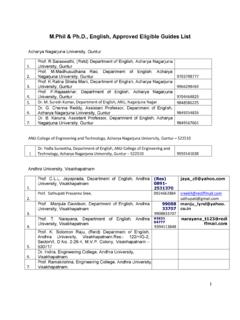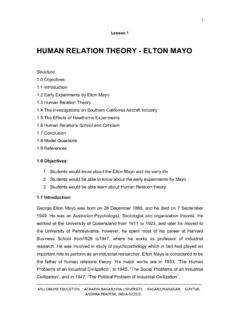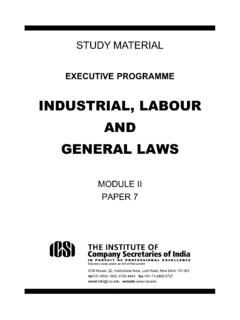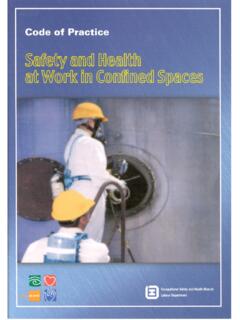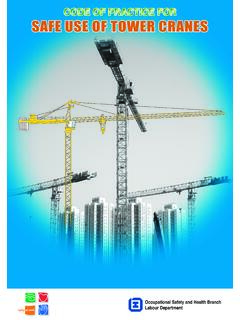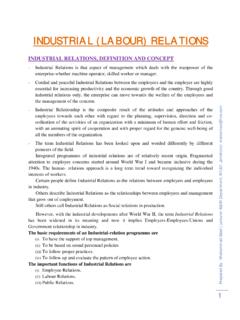Transcription of DEFINITION AND EVOLUTION OF INDUSTRIAL RELATIONS
1 UNIT 1. DEFINITION AND EVOLUTION OF INDUSTRIAL . RELATIONS . After completion of this chapter the student will be able to : Understand the DEFINITION , Nature, Scope, objectives and EVOLUTION of INDUSTRIAL RELATIONS STRUCTURE. Introduction Importance of INDUSTRIAL RELATIONS INDUSTRIAL RELATIONS in India Nature of INDUSTRIAL RELATIONS Scope of INDUSTRIAL RELATIONS Objectives of INDUSTRIAL RELATIONS Parties to INDUSTRIAL RELATIONS Significance of tripartite resolutions for Maintaining Harmonious INDUSTRIAL RELATIONS Definitions of INDUSTRIAL RELATIONS EVOLUTION of INDUSTRIAL RELATIONS Conclusion Self Assessment Questions References : INDUSTRIAL RELATIONS pose one of the most delicate and complex problems to modern INDUSTRIAL society.
2 With growing prosperity and rising wages, workers have achieved a higher standard of living; they have acquired education, sophistication and greater mobility. Career patterns have changed for larger section of the people have been constrained to leave their farms to become wage-earners and salary-earners in urban areas under trying conditions of work. Ignorant and drenched in poverty, vast masses of men women, and children have migrated to urban areas, the organizations in which they are employees have ceased to be individually owned and have become corporate enterprises. At the same time, however, a progressive, status-dominated, secondary group-oriented, universalistic, aspirant and sophisticated class of workers has come into being, who have their own trade unions and who have thus, gained a bargaining power which enables them to give a tough fight to their employers to establish their rights in the growing INDUSTRIAL society.
3 As a result, the government has stepped in and played an important role in establishing harmonious INDUSTRIAL RELATIONS , partly, because it has itself become an employer of millions of INDUSTRIAL workers, but mainly because it has enacted a vast body of legislation to ensure that the rights of INDUSTRIAL workers in private enterprises are suitably safeguarded. Besides, rapid changed have taken place in the techniques and methods of production. Long established jobs have disappeared and new employment opportunities have been created, which call for different patterns of experience and technical education. labour employer relationships have therefore, become more complex than they were in the past and haven been given a sharp edge because of the widespread labour unrest.
4 In the circumstances, a clear understanding of the factors which make for this unrest and which are likely to eliminate it would be a rewarding experience for anyone who is interested in INDUSTRIAL harmony. IMPORTANCE OF INDUSTRIAL RELATIONS : INDUSTRIAL RELATIONS constitutes one of the most dedicate and complex problems of modern INDUSTRIAL society. With growing prosperity and rising wages, workers have gained higher living wages more education, sophistication and generally greater mobility. Career patterns have changed as growing proportions have been compelled to leave the farms and become wage and salary earners under trying factory conditions.
5 Large numbers of men, women and children have concentrated in a few urban areas under mass ignorance, drenched in poverty and possessing diverse conflicting ideologies. The working organizations in which they are employed have become larger and shifted from individual to corporate ownership. There also exist progressive-achieved, status-dominated secondary group oriented, universalistic and aspirant-sophisticated class in the urban areas. Employees have their unions INDUSTRIAL RELATIONS IN INDIA: India was greatly advanced in the field of industry and commerce in the past, as evidenced from its ancient literature .in ancient times the highest occupation in our country was agriculture followed by trading.
6 Manual services formed the third rung of occupation. A large number of occupations was carried on by small manufactures in their cottages, mostly on hereditary basis. Ancient scriptures and laws of our country laid emphasis on the promotion and maintenance of peaceful RELATIONS between capital and labour . From the early days, craftsmen and workers felt the necessity of being united. The utility of unions has been stated in Sukla Yajurveda Samhita , if men are united, nothing can deter them the descriptions of unions of workmen in different occupations is found at many places in the Vedic literature and Shastras. Kautilya's Arthashastra gives a comprehensive picture of the organization and functions of the social and political institutions of India and good descriptions of unions of employees, craftsmen or artisans.
7 During the period of Harsha we hear of shrenis and Sanghs as well as unions of labourers and employers at kanauj or kula these guild worked according to their own bye-laws for the management of the unions. However, there were entirely dependent on their masters and forced work was taken from them. Historical evidence further shows the existence of rules of conduct and prescribed procedure for the settlement of disputes for promoting coordinal RELATIONS between the parties. The working RELATIONS , however, in those days were more or less of a personal character and are very much distinguishable from the present day INDUSTRIAL RELATIONS as have gradually developed with the growth of large scale industries.
8 NATURE OF INDUSTRIAL RELATIONS : INDUSTRIAL RELATIONS do not constitute a simple relationship between the employers and employees. They are complex and multi-dimensional resting economic, historical, social, psychological, ethical, political, legal and other variables. It is a dynamic concept which depends up on the pattern of society, economic system and political set-up of a country and changes with the changing economic and social order. It is an art of living together for the purposes of production, productive efficiency, human well being and INDUSTRIAL progress., the existence of good human RELATIONS , organised labour movement, collective bargaining, fair dealing by management with the workers, joint consultation at all levels, etc.
9 Is necessary for the establishment and maintenance of harmonious INDUSTRIAL RELATIONS and for building up new attitudes and institutions. INDUSTRIAL RELATIONS in the modern times call for an interdisciplinary approach to their study. If we make INDUSTRIAL disputes the centre of a circle, it will have to be divided into various segments. A study of the conditions of work, mainly of the levels of wages and security of employment, comes under the purview of economic; their origin and development under history, the resultant social conflict under sociology, the attitudes of the combatants, the government and the press under social psychology; their cultural inter-actions under cultural anthropology.
10 State policies bearing on the issues involved in the conflict under political science the legal aspects of disputes under law; the issues arising out of international aid (to combatants) under international RELATIONS ; the technological aspects (for example. Control of temperature and introduction of rationalization) of disputes under technology; and the quantitative assessment of losses incurred by the parties and the country's economy under mathematics. SCOPE OF INDUSTRIAL RELATIONS : INDUSTRIAL RELATIONS refer to the continuing relationship that emerges out of the day to day association between labour and management. There are two important aspects of such relationship: 1) RELATIONS between individual workers and manager(s) called personnel RELATIONS 2) Collective RELATIONS between labour unions and management called labour RELATIONS or labour management RELATIONS .
